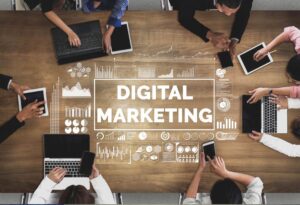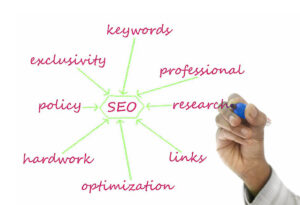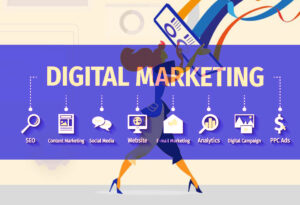Types of Video Marketing
Digital marketing is multi-faceted to say the least. With so many types out there, you may be tempted to “wing it.”
However, doing so means you could miss out on the opportunity to make the best digital marketing decision for your brand.
To ensure you have the tools to create a successful strategy that works for you, we’ve compiled a list of the top 10 of the most powerful types of digital marketing to consider:
Search Engine Marketing (SEM)
SEM is one of the more effective marketing methods in the B2B space and aims to optimize the brand presence and conversions of a business using paid methods.
In other words, SEM earns traffic by purchasing ads on commonly used SEM services like Bing Ads and Google AdWords.
Weighing the odds between SEO and PPC | Courtesy of SEO Web Analyst
These paid ads are almost indistinguishable from organic search results in Google, with the exception of the “Ad” label. They appear at the very top of the page before you even have a chance to scroll through organic results, giving you instant visibility and brand awareness.
Search Engine Optimization (SEO)
SEO is usually the first thing that comes to mind when discussing anything related to digital marketing. With most online businesses operating at the mercy of Google and other major search engines, SEO is the art of optimizing your content to ensure that your website is featured as a top result when relevant keywords are searched.
After all, 75 percent of users never visit the second page of search engines, so refining your SEO strategy is crucial if you want to generate more business from online searches.
Content Marketing
Content marketing one of the broader digital marketing terms you might come across. With the ultimate goal of persuading your audience and building credibility, content marketing typically covers content assets like blog posts, infographics, eBooks, videos, white papers, and webinars.
The four key components of a content marketing strategy
Users can interact with the content by reading, sharing, and commenting on it, which in turn, leads to more clicks, leads, and ultimately, sales.
Pay Per Click (PPC)
Pay-per-Click (PPC) falls under the SEM umbrella when it applies to ads on search engine results pages, but it can also extend to affiliate marketing and ads on other websites.
When following this type of model, you only pay for the number of clicks that you receive on your ad, making it an attractive option for businesses that have tighter budget constraints.
Email Marketing
Despite being one of the oldest types of digital marketing, email marketing still receives ROIs as high as 3,800 percent. It offers a way for you to promote your products or services, develop relationships, increase brand loyalty, and elicit useful feedback from your customers.
Plus, the possibilities of the types of emails you can send are limitless. Choose from newsletter campaigns, confirmation emails, thank-you emails, follow-up emails, and email notifications about product updates.
Social Media Marketing (SMM)
Without a doubt, social media has become the ultimate game-changer in marketing over the last decade—one that brands cannot afford to overlook.
Use social media in the awareness stage of marketing funnel
Instagram is the most used social media platform and is great for marketing
Thankfully, there are a variety of social media platforms you can choose from, including Facebook, Twitter, LinkedIn, Instagram, Snapchat, and many others. Depending on your niche and target audience, you can choose whichever one(s) is most relevant to your business.
Affiliate Marketing
With affiliate marketing, you can decrease your marketing workload by outsourcing it to external service providers.
One of the more lucrative types of digital marketing options, affiliate marketing involves partnering with an online retailer that promotes your products or services on their website. You then earn a commission from each sale or lead that you bring in. That’s right—you’re only paying for conversions. No upfront costs!
Inbound PR
The goal of inbound PR is to drive traffic to your website via content creation. Content in inbound PR needs to add value to the reader, or it will end up lost in search engine and social media algorithms.
By using programs like Google Analytics and social media analytics, PR professionals can determine what their reach is for different forms of content.
Sponsored Content
Sponsored content refers to a form of content marketing in which advertisers pay to publish their material consistent with the medium’s normal format—whether they be articles, photos, social media posts, video, etc.
This type of digital marketing is usually denoted with phrases like “brought to you by” or “sponsored by.”
Online PR
While mass media outlets such as press, radio, and television were once the main channels to distribute information about a business, online PR uses blogs, social media, and websites to connect with audiences.
Online PR also seeks to generate quality content that’s not introspective or overly promotional.












